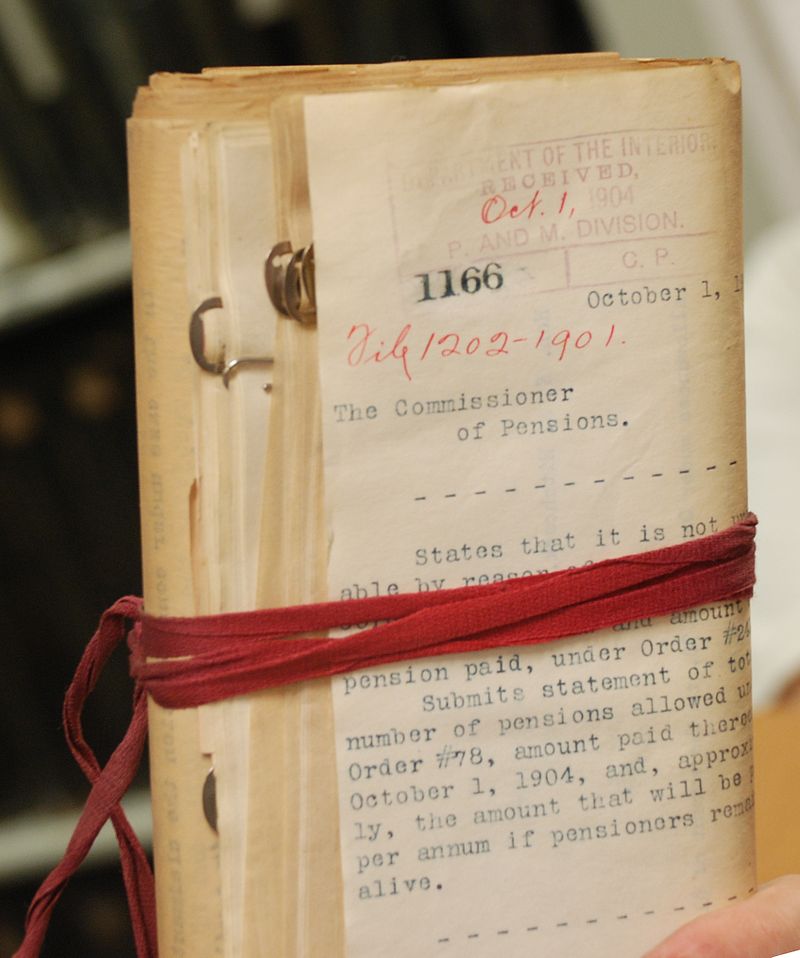Red tape
« previous post | next post »
A recent Elle Cordova video:
If I ever knew where the phrase "red tape" came from, I've forgotten it — but Wiktionary has the deets:
 Alluding to the former practice of binding government documents in red-colored tape. First use appears c. 1658 in the publication Public Intelligencer.
Alluding to the former practice of binding government documents in red-colored tape. First use appears c. 1658 in the publication Public Intelligencer.
Literal red tape is apparently a thing for (some kinds of) legal documents in (some?) English-speaking countries, but apparently not elsewhere, since the translations that I find for for metaphorical red tape are things like papeleo in Spanish, paperasserie or chinoiseries administratives in French, papelada in Portuguese, Papierkram or Papierkreig in German. Oddly, Italian doesn't seem to have a metaphorical term, just burocrazia, but readers will probably be able to add more, at least in regional varieties, as well as creative phrases in other languages.
DJL said,
August 4, 2025 @ 9:22 am
Pratiche, in the plural, in Italian.
Laura Morland said,
August 4, 2025 @ 12:13 pm
Yeah, English wins on this one: red tape is such a beautifully concrete image, as the brilliant Elle Cordova just proved.
But "… the deets"? Wow, Mark — you're so, as the French would say, "branché"!
I'd never heard this abbreviation before, but it's already made Merriam-Webster, so I didn't need to dig through the Urban Dictionary.
(All citations on m-w date from 2021 or later, with the exception of one earlier quote from Seventeen magazine [which is cited 7 times total – "deets" is definitely teen-speak].
https://www.merriam-webster.com/sentences/deets)
Viseguy said,
August 4, 2025 @ 4:31 pm
It used to be standard practice among "white shoe" law firms to bind the pages of their clients' signed Wills across the top or left side with red tape (i.e., a red ribbon) — until it wasn't. The originals are filed away in probate courts, but when I was practicing I regularly encountered images of these bindings, rendered in grayscale by the photocopier.
I loved the brilliant-red tape used in Elle's video, which, to me, only underscore the blackness of the humor.
AntC said,
August 4, 2025 @ 11:01 pm
What Viseguy said. Various school chums and rellies apprenticed as solicitors before there were computers. The files they brought home to work on [**] always were tied with actually red tape.
[**] Probably this was risking client confidentiality. Ah the days before your website could get hacked!
FM said,
August 5, 2025 @ 2:00 am
« Paperasse » or « paperasserie » is indeed rather dull and boring, but French has « rond-de-cuir » to refer to an office clerk, from the leather pads that they used to sit on.
Unrelated to the topic at hand, but the embedded YouTube video plays in French (and in a characteristically robotic voice) on my phone (which is set up in French), with no discernible way of switching it off. I had to play it in the YT app to hear it in the original. Progress? I think not.
ktschwarz said,
August 5, 2025 @ 10:22 am
Merriam-Webster's example sentences for pretty much any word are all recent — they're meant to show current usage, not history. Their Word History section claims "deets" goes back to 1986, but I'm skeptical. Green's Dictionary of Slang is a good resource for history of slang words; its first citation for "deets" is from 2004, in Urban Dictionary. That sounds more plausible.
ktschwarz said,
August 5, 2025 @ 10:43 am
Oops, I was wrong and Merriam-Webster is likely to be right with a 1980s origin for "deets", since Google Books finds "the deets" with this meaning in print as far back as 1991, in Feminist Bookstore News: "Former feminist bookseller that I am, I couldn't wait to give you the deets. Here's the scoop." And there are other examples in the 1990s. So it's more than a generation old already!
Viseguy said,
August 5, 2025 @ 2:09 pm
I was curious about the Russian for "red tape" and found the versatile волокита, which in this context, as I understand it, mainly connotes delay and is commonly modified by бюрократическая (bureaucratic) or бумажная (paper). Separately, it also means "ladykiller", which is the sense in which I encountered it in my undergraduate explorations of 19th-century Russian lit. Perhaps a native speaker will elaborate.